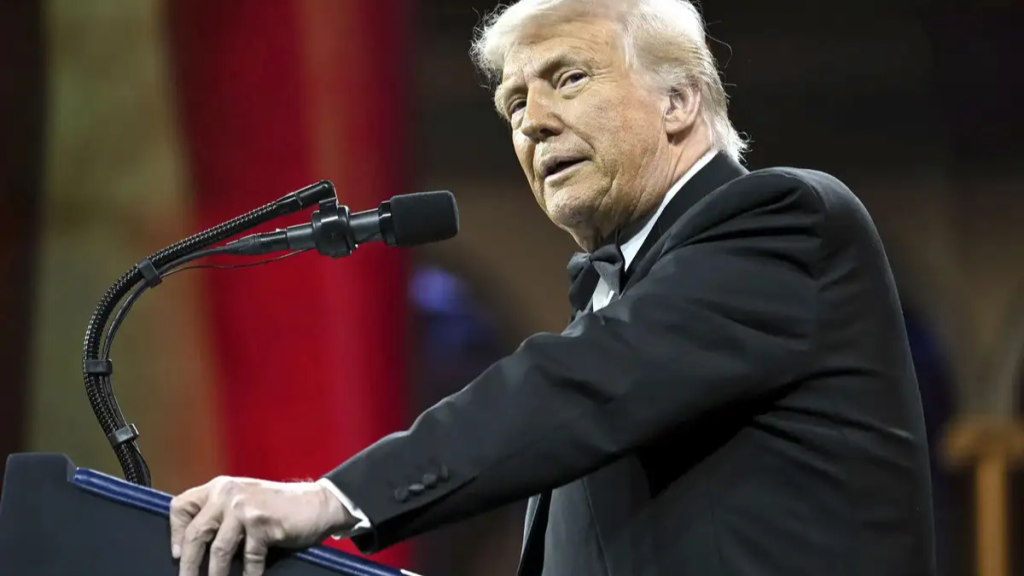Former President Donald Trump has suggested that if he returns to the White House in 2025, he will implement significant income tax cuts—and potentially eliminate federal income taxes altogether.
In a recent public appearance, Trump said the United States could use the revenue generated from new tariffs on foreign imports to replace federal income tax revenue, a move he claimed would benefit American workers and make the tax system more “fair.”
This marks a bold economic shift in Trump’s 2024 campaign rhetoric. While tax cuts were a cornerstone of his presidency from 2017–2021, the idea of replacing income taxes entirely with tariffs presents a dramatic restructuring of the U.S. tax system.
Tariffs as a Revenue Replacement? Economists Raise Concerns
Trump’s plan hinges on the concept of “universal baseline tariffs” on all foreign goods, an idea that some analysts warn could increase consumer prices and hurt lower-income families.
During his 2016 campaign, Trump emphasized economic nationalism, and he carried that approach into office by placing tariffs on steel, aluminum, and goods from China. His 2024 pitch expands on that strategy by proposing tariffs that would cover all imported goods.
According to the Tax Foundation, the U.S. collected about $2 trillion in individual income taxes in 2023. Tariffs, in contrast, generated approximately $80 billion. This disparity leaves many experts skeptical of Trump’s suggestion that tariffs could fully replace income taxes.
Still, Trump and his supporters argue that increased tariffs would bring manufacturing back to the U.S., shrink the trade deficit, and eliminate reliance on foreign economies—while generating enough revenue to cover government operations without direct taxation of personal income.

Critics Say Plan Could Increase Prices for U.S. Consumers
While Trump’s supporters praise his idea as a populist move, critics caution that the plan could lead to price hikes across the board. Tariffs are effectively taxes on imported goods, and businesses often pass those costs to consumers.
That means everyday essentials—like clothing, electronics, and groceries—could become more expensive under Trump’s plan.
“Tariffs are regressive,” said Kyle Pomerleau, a tax policy expert at the American Enterprise Institute. “They hurt lower-income Americans more because those households spend a larger share of their income on goods.”
Even conservative-leaning economists have questioned the feasibility of fully replacing income tax revenue with tariff revenue. Without drastic spending cuts or new forms of taxation, the math may simply not work, they argue.
Political Reactions and 2024 Campaign Implications
Trump’s statements have reignited debates over tax fairness, globalization, and the future of the U.S. economy. Republican lawmakers who have supported his previous tax reforms are divided.
Some embrace the idea as a way to shift the tax burden away from workers, while others worry about economic fallout from a full-scale tariff expansion.
Democrats have already seized on Trump’s remarks as evidence of his willingness to disrupt the economy for political gain. “Replacing income taxes with tariffs would be a massive tax hike on working Americans,” said Senate Finance Committee Chair Ron Wyden (D-OR). “It’s a dangerous idea masquerading as populism.”
Nevertheless, the proposal aligns with the broader theme of Trump’s 2024 campaign: economic nationalism and “America First” principles. If implemented, the policy would represent one of the most significant changes to the U.S. tax code in history.
Could This Really Happen?
Although Trump has a strong base of support among Republican primary voters, enacting such a sweeping tax reform would require Congressional approval. That would likely be difficult, even with a GOP-controlled House and Senate.
Many lawmakers remain wary of destabilizing revenue streams and risking trade wars with key partners like China, Mexico, and the European Union.
In past attempts, Trump’s tariffs have sparked retaliatory measures and disrupted global supply chains. Economists argue that relying too heavily on tariffs could reduce U.S. competitiveness and lead to higher inflation.
Still, Trump’s idea appeals to many voters who feel burdened by taxes and disillusioned by globalization. Whether or not the policy is enacted, it’s clear that Trump is betting big on tariffs and tax cuts as central components of his economic platform in 2024.
Conclusion
As the 2024 presidential campaign intensifies, Trump’s proposal to slash or eliminate income taxes in favor of tariff revenue has emerged as one of the most controversial elements of his platform.
While it plays well with his base and taps into economic grievances, experts question its feasibility and warn of potential side effects for American consumers and the global economy.
For a closer look at the economics of Trump’s tariff proposal and its potential impact, visit The Tax Foundation.
Disclaimer – Our team has carefully fact-checked this article to make sure it’s accurate and free from any misinformation. We’re dedicated to keeping our content honest and reliable for our readers.
